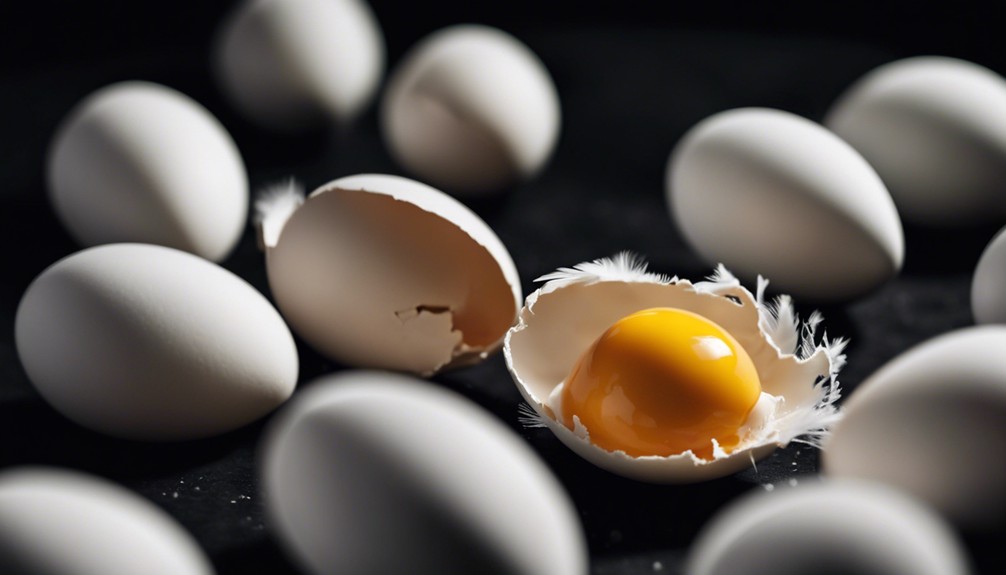I know what you might be thinking – why would a skunk in a dream hold any significance?
Well, let me tell you, dreams can often be mysterious and filled with symbolism that we may not immediately understand.
And when it comes to skunks, they can actually represent a variety of things depending on the context of the dream.
So, if you're curious about what a skunk might mean in the realm of dreams, stick around because there's more to it than meets the eye.
Skunk as a Symbol of Warning
When encountering a skunk in a dream, it serves as a potent symbol of warning, cautioning the dreamer to be mindful of potential dangers lurking in their waking life. The symbolic meaning of a skunk in dream interpretation is deeply rooted in its distinctive characteristics. Just as the skunk emits a strong and unpleasant odor to protect itself, it signifies the need for the dreamer to be aware of their surroundings and protect themselves from harmful situations.
The skunk's warning in a dream can manifest in various ways, urging the dreamer to exercise caution and remain vigilant. It reminds us to trust our instincts and intuition, as they may be trying to alert us to potential threats or deceit. The skunk's presence in our dreams is a gentle reminder to pay attention to red flags and be cautious when making decisions or entering new ventures.
This symbol of warning shouldn't be dismissed lightly, as it holds valuable insights into our waking life. It encourages us to take the necessary steps to protect ourselves and avoid potential harm. By heeding this warning, we can navigate our waking life with greater awareness and make choices that align with our well-being and safety.
Skunk as a Representation of Hidden Emotions
As we delve deeper into the symbolism of skunks in dreams, we uncover their profound representation as a reflection of our hidden emotions. Skunks, with their ability to emit a strong and pungent odor, serve as a metaphor for the emotions we keep buried within us. Just as the skunk's scent lingers in the air, our hidden emotions linger in our subconscious, waiting to be acknowledged and addressed.
Dreams involving skunks often indicate a need to unearth these emotions and confront the inner conflicts that may be causing turmoil in our lives. The skunk acts as a messenger, urging us to pay attention to the unresolved feelings that we've been suppressing. It's a reminder that true healing and growth can only occur when we face our emotions head-on.
These hidden emotions may manifest as fear, anger, or sadness, and can stem from past experiences, traumas, or unexpressed desires. By acknowledging and understanding these emotions, we can begin the process of healing and find resolution within ourselves.
The skunk's presence in our dreams serves as a call to action, encouraging us to delve into our inner world and explore the complex layers of our emotions. It's through this exploration that we can find the necessary clarity and insight to heal and move forward in our lives.
Skunk as a Sign of Self-Defense
Skunks, in their natural instinct for self-preservation, symbolize the need for us to establish boundaries and defend ourselves in the face of potential threats. Just like these creatures, we too have a survival instinct that drives us to protect ourselves from harm. The presence of a skunk in a dream can serve as a powerful message about our innate desire for self-defense.
- Setting Boundaries: The skunk reminds us of the importance of setting clear boundaries in our lives. It encourages us to establish limits and communicate them effectively to others. Just as the skunk uses its potent scent as a means of protection, we must assert ourselves and let others know when they've crossed our boundaries.
- Embracing Self-Protection: The skunk's ability to emit a strong odor serves as a symbol of protection. It teaches us the importance of embracing self-protection and taking measures to safeguard ourselves from potential harm. This may involve trusting our instincts, avoiding dangerous situations, or seeking support from others when needed.
- Asserting Personal Power: The skunk's presence in a dream can also signify a need to embrace our personal power. It reminds us that we've the ability to defend ourselves and assert our autonomy. Just as the skunk fearlessly confronts threats, we too must tap into our inner strength and stand up for ourselves in the face of adversity.
The skunk serves as a reminder that we possess the innate ability to establish boundaries and defend ourselves. It urges us to tap into our survival instincts and embrace the symbol of protection that the skunk represents. By doing so, we can navigate life with confidence and ensure our well-being.
Skunk as a Message of Self-Confidence
The presence of a skunk in dreams not only signifies the need for self-defense but also serves as a powerful message of self-confidence, reminding us of our own inner strength and resilience. When a skunk appears in our dreams, it's a symbolic reminder that we've the ability to protect ourselves and stand up for what we believe in.
Skunks are known for their potent odor, which acts as a defense mechanism. In the same way, the skunk in our dreams is a reminder that we possess the tools to defend ourselves emotionally and mentally. It's a message that we've the power to set boundaries, assert ourselves, and protect our well-being.
Furthermore, the skunk's presence in our dreams is a call for building self-esteem and finding our inner strength. Just as the skunk walks confidently, unaffected by others' opinions, we too should embrace our unique qualities and have faith in ourselves. By recognizing our own worth and acknowledging our accomplishments, we can cultivate a strong sense of self-confidence.
Skunk as a Reminder of the Need for Boundaries
In dreams, the presence of a skunk serves as a gentle reminder to establish and uphold personal boundaries. Just like the skunk, which uses its potent spray to protect itself, we too need to set limits and maintain our personal space.
Here are three key points to consider:
- Setting limits: The skunk symbolizes the importance of defining our boundaries and communicating them clearly to others. Just as the skunk marks its territory, we must assert ourselves and let others know where we draw the line. This empowers us to protect our emotional and physical well-being.
- Maintaining personal space: Like the skunk's defensive mechanism, personal boundaries are essential for self-preservation. They allow us to safeguard our energy, emotions, and values. By recognizing and respecting the need for personal space, we can nurture our relationships while also maintaining our individuality.
- Respecting the boundaries of others: Just as we expect others to respect our boundaries, it's equally important that we honor and acknowledge the limits set by others. By doing so, we foster healthier and more harmonious connections, where everyone feels safe and valued.
Dreams featuring skunks remind us to establish and uphold personal boundaries. They serve as a symbolic invitation to set limits, maintain personal space, and respect the boundaries of others. Embracing these lessons can lead to greater self-confidence and healthier relationships.
Conclusion
In the realm of dreams, the skunk emerges as a powerful symbol, carrying with it various meanings and messages. Whether it serves as a warning, a representation of hidden emotions, a sign of self-defense, a message of self-confidence, or a reminder of the need for boundaries, the skunk's presence in our dreams urges us to delve deeper into our subconscious.
Like a skunk marking its territory, our dreams mark the boundaries of our inner world, revealing truths that we may not be aware of in our waking lives. As the saying goes, 'Every skunk has its own scent.'



